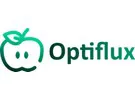This year, Optiflux has launched two new applications in the market for its measurement and control system (OptiSense™), which allows for the monitoring and management of conditions in the storage of hard fruit, among other produce. The company was awarded the Limburg Start-Up of the Year in 2022, but has now developed two new units, enabling the technology to be applied to smaller volumes of (organic) fruit. "It's essentially the same technology we offered for large cooling cells, but with OptiPallet and OptiLab, laboratories, growers, and traders managing smaller volumes can also benefit from the system," explains Niels Bessemans of Optiflux.

The principle of the technology is as follows: "Fruit doesn't always breathe in the same way," Niels explains. "As a result, there are significant differences in fruit quality when it comes out of the cooling cell." The Optiflux hardware module measures how the fruit breathes and adjusts the climate in the cooling cell accordingly. "We reduce the oxygen level in cooling cells to an optimal level so that the fruit enters a state of dormancy. Thus, you can control the conditions, but another point we have strongly focused on is accurately measuring the rate of respiration and ethylene production speed."
Until now, however, this was only available for large cooling cells, but following market demand, there was also interest in using the system for smaller volumes. "On one hand, this is about OptiPallet, where customers want to store smaller volumes at the pallet level, such as when they open a pear cell, but still want to keep a certain stock for the local store or storage of soft fruit at the level of individual pallets. On the other hand, with OptiLab, we have developed a special lab container with an internal ventilation system, to which our measurement and control system can be connected. This allows for precise measurement and control of O2, CO₂, and ethylene in such a container, which is perfect for researching optimal storage conditions for new and established varieties in laboratories and optimal use of the data," the entrepreneur continues.
 Accurately follow the entire trajectory
Accurately follow the entire trajectory
"It is also interesting for growers. If you are developing new varieties, and you only have a few trees, you don't have 300 tons of fruit in the fridge to experiment with. Yet, you want the ability for precise measurements even with smaller volumes. It is now possible to follow the entire trajectory, such as an auction with its own varieties, with this system. You can conduct very small-scale storage trials with OptiLab and then scale up to slightly larger trials up to levels of 5 tons with OptiPallet. And so, you can scale up to entire cooling cells."
From the first test to commercial storage, it can, according to Niels, be accurately followed and controlled. "And there we see a lot of interest as well. Of the new applications, one is now operational, and a second will start in the summer. The interest varies from Belgium to the USA and from Africa to Oceania. Of course, Belgium is our home base, but as a young start-up, you have to look at international markets to survive in these times. We have a product that is not limited by borders, and we are in talks with various parties where our systems are interesting for the research being conducted."
"There are more such techniques on the market, but we have put extra emphasis on the accuracy of measuring the respiration rate, but also heavily invested in the user-friendliness of the software," Niels continues. "Especially for laboratories, it is of great importance that they can define experiments well and follow up on the data. We are known for offering various software services that gather the data on one platform for possible follow-up or use in publications."
Quality and Storage Insights
This is also the reason the company is already looking towards the next steps for the future. "For instance, we launched our Quality Insights earlier this year. This is a mobile app, which we presented at the recent Fruit Logistica. You log in, scan the barcode of a pear bin and take a photo. Based on image analysis technology, you then get distributions of size, color, etc. This can be used by growers or traders to guarantee an objective quality registration."

And while the new applications mainly target smaller volumes, there is also an alternative version in the pipeline for larger customers. "This is not about the mobile app, but the same technology for in the warehouse. When one drives under it with a forklift carrying 3 crates, it automatically takes photos of the top crate going into the fridge. So, you have an image from 1 out of 3 crates in a fridge with the technology of Quality Insights. This can then be matched with our Storage Insights, which keeps track of the quality in storage to link the fruit to the needs of the buyer. With a request for a certain quality, Quality Insights lets you know you have it in a certain fridge, and with Storage Insights, you can say: 'Okay, I have 5 of them, but which one should I sell in terms of storage quality. All data comes together on one platform, giving you all the information needed to make a choice. Ultimately, we want to guarantee optimal quality throughout the entire chain with our technology," concludes Niels.
For more information: Niels Bessemans
Niels Bessemans
Optiflux
+32 (0) 478 38 27 54
[email protected]
www.optiflux.world
